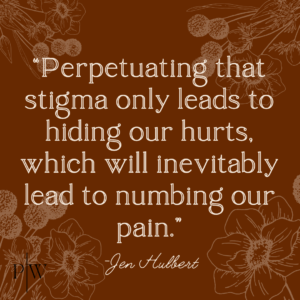I was folding laundry on my bed, tears slowly rolling down my cheeks as I listened to a podcast.
The women I was listening to weren’t saying anything particularly ground-breaking, and yet I felt like they were looking across my laundry-strewn bedroom and into my eyes, speaking directly to me. “Call a therapist. Google biblical counselors in your area right now. Dial the phone number, set up a consultation. You can do this.” Their words pierced my heart. It was what I needed to hear.
For years I had felt a nudge to seek counseling, but there was always a reason not to.
Cost.
Finding someone good.
Childcare.
What if I’m actually fine?
What if someone from church knew?
Maybe I’m overreacting.
Can’t a bible verse solve this?
But for some reason that day, with that podcast, the Holy Spirit moved me to pick up my phone, do the search, and make the call (praying no one would answer).
Midway through that initial phone call I already started backing out. “Well, honestly, I think I’m really fine. It’s ok, you don’t have to work out a special price just because I’m in ministry. I just need to manage my stress better, but really I’m not that stressed, maybe I should just call another time.”
Bless the woman on the other end of that call. She wasn’t letting me go. And neither did my wonderful therapist as we sat across from each other in a warm, bright room shortly after that.
I’m not sure what I expected from my first session. I was honestly worried we wouldn’t have anything to talk about. But as the questions came, something buried deep, deep within me began to stir up and spill out. Long closed doors creaked open and the darkness inside was brought into the light.
Over the next several months, I experienced a wild sense of healing and wholeness I didn’t even realize I needed. First came the pain, though. The opening up of wounds I had chosen to stuff down, or memories that were too scary to walk through on my own. The pain of recounting trauma in order to peg down what lies I had been led to believe because of what had taken place. Lies like:
No one is going to protect you.
You are alone in this.
Anger is safer than vulnerability.
Something is wrong with you.
You’ll never be enough.
Lies that have no place swirling around the mind of a daughter to the King. Lies that Jesus fought with His life to disprove. Lies that the enemy had been using for far too long in my life, creating an inaccurate filter through which I saw the world.
My therapist called those lies “cognitive distortions,” which is basically a thought that causes a person to perceive reality inaccurately. When we are ignoring toxic lies planted by pain, we are not seeing reality as it truly is. We are not living in such a way that we are able to fully serve others and live wholly.
God created us as relational beings. He uses others to speak into our lives, to correct our course, to spur us on, to bring us wise counsel. As shepherds, I think sometimes we forget that we need to be shepherded, too. Or there is a stigma surrounding therapy that stops us from reaching out. As if to ask for help indicates you are disqualified from leading.
Perpetuating that stigma only leads to hiding our hurts, which will inevitably lead to numbing our pain.
Those leading in ministry must have the freedom and the encouragement to seek therapy. The load of this role in and of itself is too heavy a weight to carry alone. There must be a safe place shepherds can go to share their burdens in confidentiality and receive the wisdom and care from a trained specialist. The only way we can lead well is if we are coming from a place of our own healing and growth. Wounded and weary shepherds cannot lead their flock.
I don’t know your story, but I do know you have hurts, habits, and hang-ups. I know this because you live in a broken world just like I do. Here are a few questions to ask that might help you decide if therapy might be beneficial:
How are your sleep habits? Do you fall asleep easily? Do you wake up often in the night?
What is your relationship with alcohol like?
What is your relationship with food like?
What is your relationship with shopping like?
Do you find yourself mindlessly scrolling/numbing out on social media?
How’s your tummy?
When was the last time you yelled at someone?
When was the last time a situation felt hopeless?
There is so much freedom and hope found on the other side of sound, biblical counseling. I promise you, you are not alone and you are not defective. My hope is that these words might reach someone like that podcast reached me, someone who needs to seek counseling but is afraid to take the first step. Call a therapist. Google biblical counselors in your area. Dial the phone number, you can do this.
Grace and peace.
Taking it further:
Did your answers to any of these questions surprise you?
What is the next step you’re going to take in response to that?



Jen, thank you so much for this article! Your vulnerability is so helpful for all of us thinking through this process. You perfectly captured so much of what swirls in our minds when we think about getting help. And I couldn’t agree more – we need to be able to reach out and ask for help. The times that I have done this have surprised me with how much I needed it and how much it helped. It’s ok to not be ok, and God designed His people to be a body for a reason. Thank you again!
I’m so thankful, yes and yes!